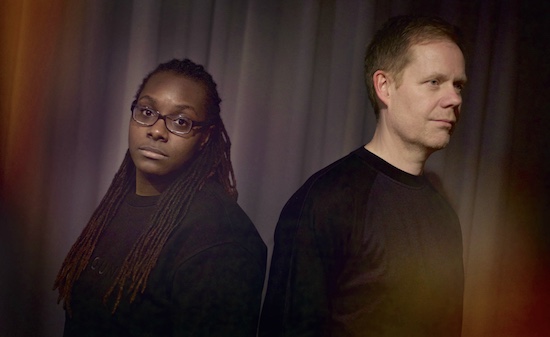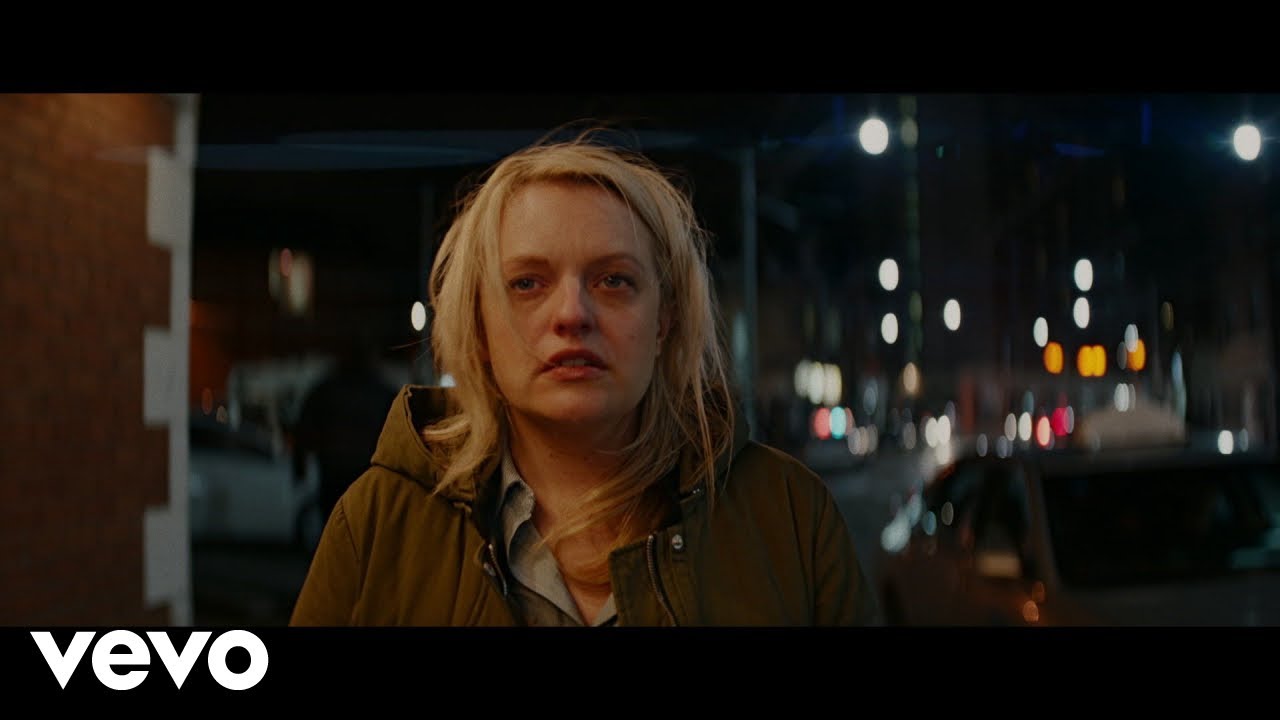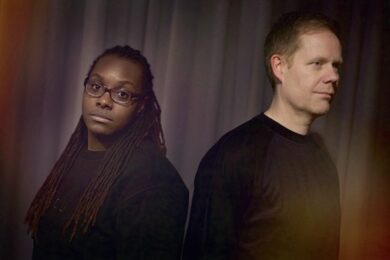Music writers. Who needs ’em? We recently had the opportunity to get Jlin and Max Richter together (over the ether) and left them to have a conversation about their individual practice. Jlin is a footwork producer/ electronic music composer from Indiana, US. Her last album Black Origami was released by Planet Mu in 2017. She has several US, African and European festival dates planned for Summer/ Autumn 2018 including Unsound, Krakow. Max Richter is a West German born, British composer. His 2004 album The Blue Notebooks has just been reissued by Deutsche Grammophon with several bonus tracks. He has released a short film to go with the track ‘On The Nature Of Daylight’, which you can see below.
Jlin remixed the track ‘Vladimir’s Blues’ for the recent remastered and expanded edition of The Blue Notebooks which is out now on Deutsche Grammophon.
Max Richter Interviews JLin
What are your first musical memories? Do they play a part in what you are doing now? Was there music in your family?
Jlin: My first musical memories are my mother playing her Luther Vandross records while we did housework. Those memories definitely play a role now especially when I need to take a break from my own work. Listening to old records that my Mum introduced me to is relaxing and always a moment to learn from the greats. There was music all throughout my household, as my father loves jazz music. As a child I can remember taking road trips and listening to music all the way until we got to our destination.
Are there any touchstone tracks for you that made you feel, “Yeah I want to do something like that”? Did you have a “lightbulb” moment”? Or does your work come from another place?
JL: When I first heard Sade’s song ‘Stronger Than Pride’ I was completely blown away by the drums. I had never heard that type of sound come from a drum set before. Inside I was dying to know where a sound that unique comes from. I later discovered that the drummer was using a specific type of drumstick. Hearing this track didn’t make me say, “I want to do something like this”, but it did make me want to experiment with sound. My work solely comes from my core. When I create a piece, it’s simply me expressing myself through sound.
You have a background in mathematics – many people have commented on the link between music and maths – how does this link manifest itself in your work?
JL: In my opinion mathematics and music are exactly the same. Music consists of limitless permutations and combinations especially when it comes to arrangement and sound placement. Music and math are both an infinite as well as a universal language. I try to apply the mathematical aspect as much as I can when I’m composing.
Does music feel like a way of talking for you? Is sound a language?
JL: Music for me is a way of expressing, more so than talking, in the aspect of creating. I consider music a more talkative thing when I’m listening to it. Sound is definitely its own language, and it’s vital. Music is said to be a “universal language” and I agree with this quite a bit. It brings different people from different walks of life together in beauty and harmony.
Your work incorporates various sorts of vocal elements from time to time – do you think of these as “sounds" or do you intend to have them speak as language?
JL: Vocals for me go hand in hand as sound as well as a language itself. The placement of a vocal is massively important to me. They must align with the rhythm whether they flow together or play against each other. All of this is a possibility in my creating as long as the flow of what I’m doing doesn’t get lost or disappear altogether.
You are a virtuoso sculptor of audio – what part does technique play in your work? How do technique and feeling connect?
JL: My technique when it comes to audio is intuition. I consider myself intuitive because the feeling of the sound in what I’m trying to convey is important to me. Impact and feel have always been my driving force when I create. I connect best with my work when I can feel it.
Your music feels very personal to me – are you concerned that people “get” what you are saying in your work, or are you content for them to find their own relationships to the music?
JL: I’m just the creator of my work, I think it’s an insult and egotistical of me to be concerned with whether someone’s understanding of my work aligns with mine. When people listen to my work I want them to draw their own conclusions and create their own imaginations. I would never want to destroy the things my audience comes up with in their heads when I listen to my work. It’s important to me that my audience feel what they feel.
What part does/should creativity play in society? Can music be an effective political tool?
JL: In society music plays the role of so many things such as conveying messages whether it be social, political, religious, or conscious just to name a few. Music also can play the role of meditation, recreational listening, choreography purposes, as well as media of course. Instrumentation is all around us every day, we just have to listen, and know what to listen for. Music can absolutely be a political too. John Legend’s song ‘Yes We Can’ created for President Obama’s campaign is a great example of this.
Do you have a specific set of instruments you are using? How important are the tools you use in your work?
JL: I use a lot of different instrumentation on a daily. Percussion is my first love I must say. Instrumentation plays a major role in my work these days. I’ve truly grown a new level of appreciation for instruments. Every instrument has its place, and knowing where to place them takes time, experience, and quite a bit of trial and error.
Do you have a regular working day? Is making music “work” to you, or more like play?
JL: When my schedule is normal and I’m not on the road, yes my days are usually spent working. Honestly in this last year music has become more work and less play. I’m totally fine with that though.
JLin Interviews Max Richter
Do you consider yourself an intuitive composer?
Max Richter: For me composing is a mix of intuitive and conscious processes. The intuitive part is to do with chasing down the overall ideas and feelings I’m trying to get at, and, once I have a sense of those then technique plays a bigger part – making a sonic object that (to me at least) conveys that intuition.
Your Blue Notebooks piece is impeccable work, truly outstanding. How did you put Blue Notebooks together? Where does a sound like that come from?
MR: The Blue Notebooks – coming up to its 15th birthday now – is really the second part of me building a language (the first was Memoryhouse from 2002). I had come from the high modernist academic music tradition, where the orthodoxy was “complex = good” and I was seeking a way toward a language that was more inclusive; something that could speak to an audience outside of the academic music cliques, something less politically oppressive.
So this meant finding ways to simplify the externals of the language to increase it’s “legibility”. But, because I value craft and beautifully made things, I didn’t want to short circuit technique, but rather write work that, while being well made, appeared to be simple. ‘On The Nature Of Daylight’, for example, is on one level a bit of five part counterpoint that at Renaissance composer would recognise, but it is also very plain speaking on a sonic level. The sonic elements of that piece in a way sum up the project; a string quintet play a written score, a Minimoog supplies the bass line, and its all recorded on 16 track 2 inch tape via the MCI desk used on the later Bob Marley records…
Listening to your work, one thing is for certain, you always know exactly when to strike, whether it be unpredictable strings of grace, or a beautiful brass intersection with an unidentifiable ambient sound. How do you know when to strike?
MR: That’s a great question! I think that is an example of the role of intuition you mentioned above. It is like when a good cook is improvising a dish in the kitchen – they just seem to know when to throw things in.
I find that being able to hear and listen takes times and experience. It’s a constant evolving process. Do you feel like your hearing has matured your last album to your current one?
MR: I think that each project brings its own opportunities to learn. Actually I feel like every piece of writing is really an experiment – a kind of “What if…?” question, that either gets answered in the writing or when it meets a listener.
When I listen to your work, I feel like instrument placement plays a major role for you. How and when do you decide placement when writing a piece?
MR: Yes, you are right – this is really important. I’m looking for something that conveys the maximum from the minimum, so that means I try to give every tiny piece close attention so that it fits into the overall picture perfectly. So this means the right choice of instrument, mic’d up the right way, positioned in the stereo image in the right way, with the right frequency spectrum relative to all the other elements, the right dynamic range, the right reverberations etc. I’m super nerdy about this kind of thing because, even though most people don’t really notice these things consciously, all these hundreds of little details build up to something that works on the unconscious part of our minds, to tell the story.
I think there is also a maybe slightly puzzling phenomenon in certain really well made records in that the finished recording seems to convey a sense of the time spent on them, and that is something I aspire to.
Has there ever been a time where you had piece in your head, but was unsure if or how you would create it?
MR: Every Day!
Max clearly the authenticity and honesty in your work is purely defined. How do you pull these things from your inner core to your satisfaction?
MR: I see my job as trying to follow the music where it seems to want to go. This is in a way irrational, but, like novelists say that sometimes their characters start doing things they weren’t expecting, musical material does this too. I’m looking for that sort of energy.
Do you start composing on paper first, or do you start at the piano? If neither, then where do you start from?
MR: Instrumental music starts mostly on paper, but I play the piano whenever I can – its my sketch pad. Electronic things is me twisting the dials.
Does nature play a role in your work in any way?
MR: Absolutely. Being in touch with something beyond our personal ego concerns is hugely important. Nature is the door.
What do you find most difficult in the process of composing?
MR: Stopping composing!
I know this question might seem simple or even common, but do you ever get writer’s block? If so how do you surpass that state?
MR: I’m always writing at some level if I’m awake – maybe even when I’m asleep – so this hasn’t happened to me so far…
When is the last time that you consciously remember questioning a piece and being unsure about it?
MR: Every day. I feel like it takes time to evaluate things and get an understanding of them. Everything is provisional in a way, and new work is the chance to learn new things.
How long does it take you to write a piece?
MR: The big things like Ballets, Operas, big movies take months. Little piano pieces or short instrumental works sometime arrive fully formed and I just write them down. The modular synthesisers can eat up hours and days very easily!
Is there a piece you’ve done that you would want to go back and make edits to, or re-due completely?
MR: In a way that probably applied to most of my work – I just hear the imperfections – but I resist the temptation – better to do new things!
Are you close with your parents?
MR: I am with my mother.
The Blue Notebooks is out now




